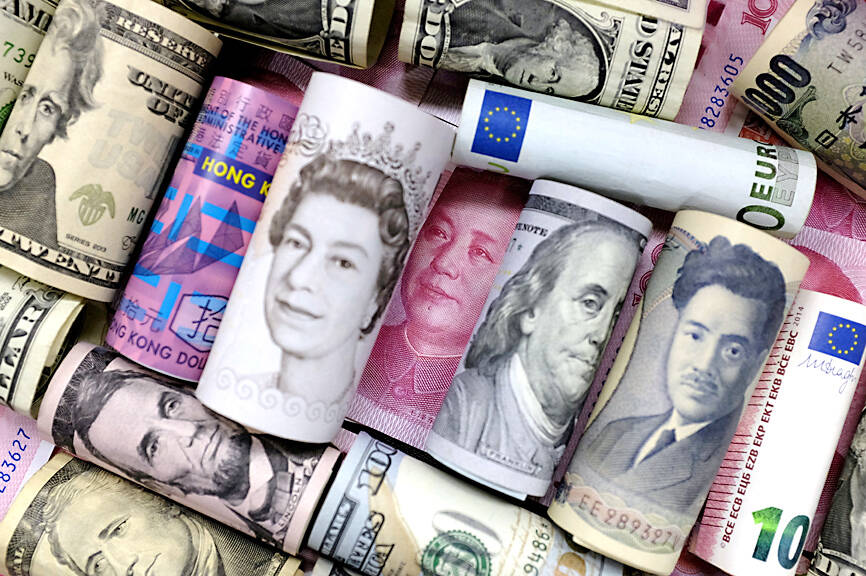Taiwan’s foreign exchange reserves last month gained US$1.13 billion from the previous month to US$577.98 billion, backed by higher interest income, which offset capital outflows, the central bank said yesterday.
November is the high season for the central bank to collect interest income on its bond holdings, Department of Foreign Exchange Deputy Director-General Ho Lan-chih (賀蘭芝) told a media briefing in Taipei.
“The currency market is quite stable and the central bank rarely stepped in to maintain market order and stability,” Ho said.

Photo: REUTERS
However, foreign portfolio managers trimmed their positions in local equities and bonds amid anxiety over US president-elect Donald Trump’s tariff threat, which could weigh on Taiwan’s electronics exports, she said.
The global capital movements also had to do with Trump’s pledge to “make America great again” through tax cuts and protectionist trade measures, which lent support to the US dollar against almost all other major currencies, Ho said.
Last month, the euro fell 2.27 percent, the British pound declined 2.28 percent, the Chinese yuan shrank 1.37 percent and the New Taiwan dollar depreciated 1.51 percent against the US dollar, she said, adding that the yen managed to buck the trend with a 2.14 percent increase.
Financial markets are now looking at a potential interest rate cut by the US Federal Reserve later this month after the latest data showed the US economy was relatively resilient, but appeared to be wanting in strength, Ho said.
The US dollar index, which measures the greenback against a basket of major currencies, picked up 1.69 percent last month, Ho said.
The movement of the greenback would continue to dominate the NT dollar’s direction even though the brief martial law declaration in South Korea helped boost the local currency this week, she said.
Taiwan last month replaced India as the world’s fourth-largest holder of foreign exchange reserves after China, Japan and Switzerland, central bank data showed.

Hon Hai Precision Industry Co (鴻海精密) yesterday said that its research institute has launched its first advanced artificial intelligence (AI) large language model (LLM) using traditional Chinese, with technology assistance from Nvidia Corp. Hon Hai, also known as Foxconn Technology Group (富士康科技集團), said the LLM, FoxBrain, is expected to improve its data analysis capabilities for smart manufacturing, and electric vehicle and smart city development. An LLM is a type of AI trained on vast amounts of text data and uses deep learning techniques, particularly neural networks, to process and generate language. They are essential for building and improving AI-powered servers. Nvidia provided assistance

STILL HOPEFUL: Delayed payment of NT$5.35 billion from an Indian server client sent its earnings plunging last year, but the firm expects a gradual pickup ahead Asustek Computer Inc (華碩), the world’s No. 5 PC vendor, yesterday reported an 87 percent slump in net profit for last year, dragged by a massive overdue payment from an Indian cloud service provider. The Indian customer has delayed payment totaling NT$5.35 billion (US$162.7 million), Asustek chief financial officer Nick Wu (吳長榮) told an online earnings conference. Asustek shipped servers to India between April and June last year. The customer told Asustek that it is launching multiple fundraising projects and expected to repay the debt in the short term, Wu said. The Indian customer accounted for less than 10 percent to Asustek’s

‘DECENT RESULTS’: The company said it is confident thanks to an improving world economy and uptakes in new wireless and AI technologies, despite US uncertainty Pegatron Corp (和碩) yesterday said it plans to build a new server manufacturing factory in the US this year to address US President Donald Trump’s new tariff policy. That would be the second server production base for Pegatron in addition to the existing facilities in Taoyuan, the iPhone assembler said. Servers are one of the new businesses Pegatron has explored in recent years to develop a more balanced product lineup. “We aim to provide our services from a location in the vicinity of our customers,” Pegatron president and chief executive officer Gary Cheng (鄭光治) told an online earnings conference yesterday. “We

LEAK SOURCE? There would be concern over the possibility of tech leaks if TSMC were to form a joint venture to operate Intel’s factories, an analyst said Taiwan Semiconductor Manufacturing Co (TSMC, 台積電) yesterday stayed mum after a report said that the chipmaker has pitched chip designers Nvidia Corp, Advanced Micro Devices Inc and Broadcom Inc about taking a stake in a joint venture to operate Intel Corp’s factories. Industry sources told the Central News Agency (CNA) that the possibility of TSMC proposing to operate Intel’s wafer fabs is low, as the Taiwanese chipmaker has always focused on its core business. There is also concern over possible technology leaks if TSMC were to form a joint venture to operate Intel’s factories, Concord Securities Co (康和證券) analyst Kerry Huang (黃志祺)